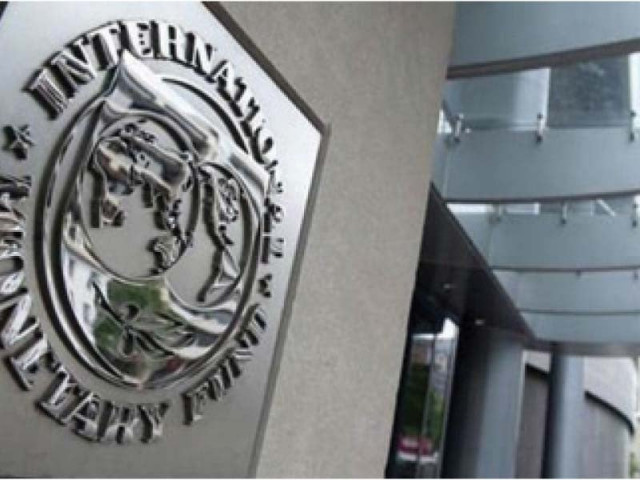‘Confident’ Pakistan to meet IMF for review talks on Nov 2
Staff-level agreement will pave way for approval of second loan tranche of $710m by the IMF board in Dec

The International Monetary Fund (IMF) has agreed to begin talks from Nov 2 for the release of $710 million second loan tranche, as the government remains confident that it will successfully complete the programme review amid some external sector challenges.
A clarity on next general elections date can further strengthen the hands of the Ministry of Finance during the upcoming review talks for the July-September period of this fiscal year, although the IMF has not explicitly attached any such condition.
An IMF team led by Nathan Porter will field a mission to Pakistan starting on Nov 2 on the first review under the current Stand-By Arrangement (SBA) of $3 billion, Esther Perez, the resident representative of the IMF, told The Express Tribune.
The IMF had proposed Nov 7 in anticipation of a delay in compiling the first quarter data but the Ministry of Finance assured that all the relevant data was available for the review talks, according to sources.
Read: Gas tariff hike to fuel inflation
The first review talks will be held for the second loan tranche of $710 million and a staff-level agreement would pave the way for its approval by the IMF board in December. While approving the $3 billion loan in July this year, the IMF had also released the first tranche of $1.2 billion.
The federal government and the State Bank of Pakistan remain hopeful that they would comfortably complete the review on back of meeting the conditions agreed with the IMF in July.
However, the external financing gap remains a hard area for the government, as the Ministry of Finance’s internal assessment shows a wide gap between the loans planned to be received and the actual disbursements during the current fiscal year.
Only on account of Eurobonds and the foreign commercial loans, the government has recently estimated a shortfall of $4.5 billion. The hole is even bigger than this while taking into account shortfall against some other projected disbursements.
The exchange rate management and the monetary policy stance are the other two areas that would be minutely reviewed by the IMF, a senior government functionary said on Tuesday.
After showing constant downward trajectory for over a month, the dollar has again started strengthening against the rupee during past couple of days.
The rupee deprecation is seen as a prelude to the IMF talks.
Read more: JI blasts IMF influence on Pakistan’s policies
The rupee has appreciated by 8% in the interbank market and by 14% in the open market during the past over one month due to a military-pushed crackdown against the hoarders and smugglers and management of imports.
The sources said that the international financial institutions are eager to have a clarity on the political horizon.
Under the Constitution, the elections have to be held by Nov 9 but the Election Commission of Pakistan has indicated the end of January 2024 as a tentative period for the elections.
Highly placed sources told The Express Tribune that during the recently held IMF-World Bank annual meetings, Pakistani delegation faced three major questions in almost every meeting.
The finance ministry officials were asked about the status and role of the Special Investment Facilitation Council, the prospects of next elections, and the mandate of the interim government, the sources said.
Unlike the last failed $6.5 billion programme, the Ministry of Finance seemed committed to meeting the conditions set for the $3 billion programme during past three months.
At many occasions, the finance secretary appeared receptive to the IMF queries and ensured transparency.
This was contrary to the past practice when the Ministry of Finance appeared dragging feet on the $6.5 billion deal that eventually collapsed.
The $6.5 billion Extended Fund Facility could not be completed and the programme expired on June 30 with $2.6 billion undisbursed.
IMF Director of Strategic Communications Julie Kozack had said in July that “steadfast implementation” of the nine-month SBA was “critical to Pakistan’s future”.
Read also: Rupee at Rs279/$ as IMF review looms
SBP Governor Jameel Ahmad said this month that the central bank was “comfortably placed” in terms of meeting end-September IMF targets.
He had said that SBP’s forward foreign exchange liabilities had declined and the forward book target of $4.2 billion for end-September 2023 agreed with the IMF was met by a wide margin.
Similarly, the SBP is also very comfortably placed to meet the other end-September IMF targets of a negative $14.5 billion Net International Reserves (NIR) and Net Domestic Assets (NDA) of Rs15 trillion, according to the central bank governor.
A cabinet minister dealing with one of the economic ministries said on Tuesday that the Power Division comfortably met the IMF’s condition about the circular debt reduction plan.
The government has already increased the electricity prices and the gas prices have also been increased with effect from Nov 1.
The original ceiling for addition in the circular debt was Rs155 billion for the first quarter but it has lately been revised to Rs292 billion.
The government had also given a commitment to the IMF that it would not give fuel subsidy or the cross subsidy.
However, cross subsidies have been approved for domestic exports and industrial gas consumers.
The primary budget deficit target for the first quarter is Rs87 billion, which might be met on back of exceptional good performance by the Federal Board of Revenue and stopping public sector development spending.
However, the government may not be in a position to meet the end year’s primary surplus target of Rs421 billion. Except for Punjab, the provincial governments have not spent significant amounts under their annual development plans during the first quarter.



















COMMENTS
Comments are moderated and generally will be posted if they are on-topic and not abusive.
For more information, please see our Comments FAQ